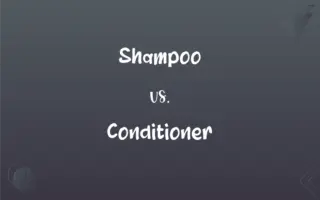Inductance vs. Capacitance: What's the Difference?
Edited by Aimie Carlson || By Harlon Moss || Published on December 28, 2023
Inductance is the property of a conductor to oppose changes in current flow, storing energy in a magnetic field, while capacitance is the ability of a system to store an electric charge, storing energy in an electric field.

Key Differences
Inductance, denoted by 'L', is a measure of how much a conductor opposes changes in current, creating a magnetic field. Capacitance, denoted by 'C', is the measure of a system's ability to store electrical charge, forming an electric field.
Inductors, often coils of wire, are the physical manifestation of inductance. Capacitors, composed of two conductive plates separated by an insulator, represent capacitance.
Inductance stores energy in a magnetic field when current flows through the conductor. Capacitance stores energy in an electric field created by a separation of charges across the plates.
In a circuit, inductance resists changes in current, causing a phase shift between voltage and current. Capacitance allows charge build-up, causing a phase shift between current and voltage.
Inductance is key in transformers, inductors, and electromagnets. Capacitance is crucial in capacitors, used in electronic circuits for filtering, energy storage, and timing applications.
ADVERTISEMENT
Comparison Chart
Definition
Opposition to changes in current, storing energy in a magnetic field
Ability to store electrical charge, storing energy in an electric field
Symbol
L
C
Physical Form
Coils of wire (inductors)
Conductive plates separated by an insulator (capacitors)
Energy Storage
Magnetic field
Electric field
Circuit Behavior
Causes phase shift between voltage and current
Allows charge build-up, causing phase shift between current and voltage
ADVERTISEMENT
Inductance and Capacitance Definitions
Inductance
The ability of a conductor to create a magnetic field.
The inductance of the coil increased as more turns were added.
Capacitance
Used in timing and filtering applications in circuits.
Capacitance is essential for the timing mechanism in the circuit.
Inductance
Storing energy in a magnetic field.
The inductor's inductance is key to its energy storage capacity.
Capacitance
The ability to store electrical charge.
The capacitor's capacitance was sufficient for the circuit.
Inductance
Contributing to impedance in alternating current circuits.
Inductance was responsible for the circuit's impedance.
Capacitance
Storing energy in an electric field.
Capacitance is crucial for energy storage in the electric field.
Inductance
Playing a crucial role in transformers.
The transformer's efficiency depends on its inductance.
Capacitance
Relating voltage to stored charge.
The capacitance determined how much charge was stored at a given voltage.
Inductance
Resisting changes in electrical current.
High inductance in the circuit prevented sudden changes in current.
Capacitance
Affecting impedance in alternating current circuits.
The circuit's capacitance altered its overall impedance.
Inductance
The property of an electric circuit by which an electromotive force is induced in it as the result of a changing magnetic flux.
Capacitance
The property of a circuit element that permits it to store charge.
Inductance
A circuit element, typically a conducting coil, in which electromotive force is generated by electromagnetic induction.
Capacitance
The ratio of charge to potential on an electrically charged, isolated conductor.
Inductance
(physics) The property of an electric circuit by which a voltage is induced in it by a changing magnetic field.
The power cable itself has enough inductance to disrupt the digital signal of the video output cable, due to poor shielding.
Capacitance
The ratio of the electric charge transferred from one to the other of a pair of conductors to the resulting potential difference between them.
Inductance
The quantity of the resulting electromagnetic flux divided by the current that produces it, measured in henries (SI symbol: H.)
What is the inductance of that power supply's main inductor?
Capacitance
The part of the circuit exhibiting capacitance.
Inductance
Capacity for induction; the coefficient of self-induction.
Capacitance
The property of an electric circuit or its element that permits it to store charge, defined as the ratio of stored charge to potential over that element or circuit (Q/V); SI unit: farad (F).
Inductance
(physics) a property of an electric circuit by which an electromotive force is induced in it by a variation of current
Capacitance
An element of an electrical circuit exhibiting capacitance.
Inductance
An electrical device that introduces inductance into a circuit
Capacitance
An electrical phenomenon whereby an electric charge is stored.
Capacitance
A measure of the ability of a capacitor to store electrical charge; the ratio of the charge on one plate of a capacitor to the potential difference between the plates.
Capacitance
An electrical phenomenon whereby an electric charge is stored
Capacitance
An electrical device characterized by its capacity to store an electric charge
FAQs
What is the unit of inductance?
The unit of inductance is the Henry (H).
What does capacitance measure?
Capacitance measures a system's ability to store electrical charge.
What does inductance measure?
Inductance measures a conductor's opposition to changes in current.
Where is inductance commonly used?
In transformers, inductors, and electromagnets.
How is energy stored in capacitance?
Energy is stored in an electric field in capacitance.
Where is capacitance commonly used?
In capacitors, for filtering, energy storage, and timing in circuits.
Does inductance affect AC circuits?
Yes, inductance causes a phase shift in AC circuits.
What happens to inductance when current changes rapidly?
Rapid current changes increase the magnetic field, affecting the inductance.
How does capacitance respond to voltage changes?
Capacitance determines how much charge is stored for a given change in voltage.
What is the unit of capacitance?
The unit of capacitance is the Farad (F).
Can inductance and capacitance be used together?
Yes, they are often used together in electronic circuits for various functionalities.
How is energy stored in inductance?
Energy is stored in a magnetic field in inductance.
Do capacitors react differently to different frequencies?
Yes, capacitors behave differently across frequencies, affecting their ability to store charge.
Can inductance be controlled?
Inductance can be controlled by altering the coil's properties, like the number of turns.
Is it possible to adjust capacitance?
Capacitance can be adjusted by changing the properties of the capacitor, like the distance between plates.
Does capacitance affect AC circuits?
Yes, capacitance allows charge build-up, affecting AC circuit behavior.
Can inductance be found in everyday electronics?
Yes, inductance is present in many common electronic devices, like transformers in power supplies.
Are inductors affected by frequency?
Yes, inductance values change with the frequency of the alternating current.
Are there safety concerns with high inductance or capacitance?
Yes, high inductance and capacitance can pose safety risks, such as high voltage or current surges.
Is capacitance a factor in everyday electronic devices?
Absolutely, capacitance is a critical component in most electronic devices, such as in tuning circuits and energy storage.
Do inductance and capacitance have an impact on power consumption?
Yes, both can affect power consumption in a circuit, albeit in different ways.
About Author
Written by
Harlon MossHarlon is a seasoned quality moderator and accomplished content writer for Difference Wiki. An alumnus of the prestigious University of California, he earned his degree in Computer Science. Leveraging his academic background, Harlon brings a meticulous and informed perspective to his work, ensuring content accuracy and excellence.
Edited by
Aimie CarlsonAimie Carlson, holding a master's degree in English literature, is a fervent English language enthusiast. She lends her writing talents to Difference Wiki, a prominent website that specializes in comparisons, offering readers insightful analyses that both captivate and inform.






































































